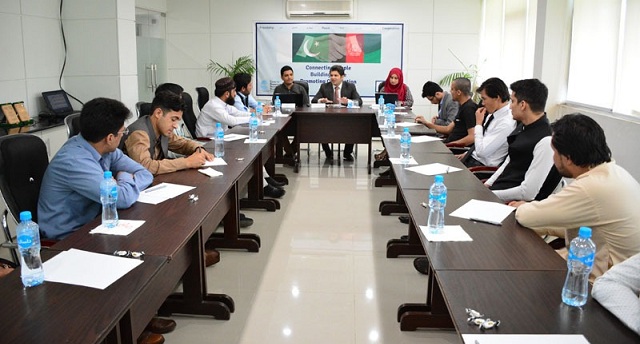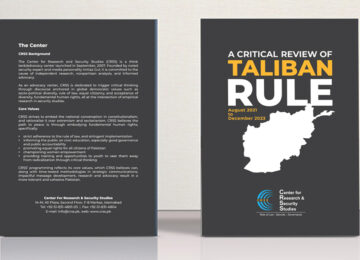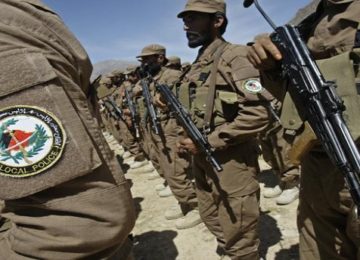Afghan peace process is the most frustrating the world has ever seen where fighting or harnessing peace both are equally challenging. Since long the Afghan quagmire has been a game play in the hands of several regional and international players. Of late, China has apparently got a driver’s seat in the Afghan peace process as it enjoys trust and good relations with most stakeholders. China’s role in Afghan peace process appears to be quite distinct in this regard as the country has reportedly not nurtured any proxy war nor any covert operations inside Afghanistan. This was stated by IR expert Salman Ali Bhittani from Quaid-i-Azam University who was speaking to Pak-Afghan youth on Wednesday, June 27, 2018, at the Center for Research and Security Studies (CRSS) in Islamabad. Participants included several young Afghans and Pakistanis belonging to Islamabad, Peshawar, Bannu, Mardan, and tribal districts of Khyber Pakhtunkhwa.
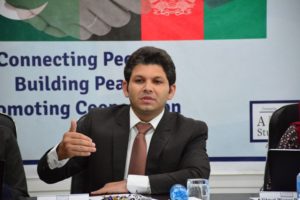
Mr. Bhittani stated that China is situated at the edge of South Asia and is very much connected to the region politically, and the rise of China would be staging from this region; that is why Beijing is keenly interested in the unfolding regional crescendos. Beijing has taken up the same soft power modus operandi in Afghanistan which is determined by its domestic policy of acquiring economic progress and development and mainly includes economic ventures and regional connectivity abroad.
He stated that as US intervention in Afghanistan appeared to have two aspects; mainly revolving around utilizing the mineral resources of Afghanistan and Central Asia and the containment of China, experts anticipated an alarm with respect to China as US presence grew in Afghanistan. However, China appeared to be only observing in silence. It adopted a proactive strategy in Afghanistan after United States’ pull-back from its 2014 withdrawal plan – implying no end to the conflict in the near future, he said. However, even then, as opposed to the US strategy, the country’s regional strategy is aimed at securing its economic ambitions and not affording prolonged turmoil in its surrounding region.
Chinese concerns in Afghanistan are only to acquire peace and stability in Afghanistan by whatever means possible, while on the other hand the US complex Afghan peace plan includes not only countering insurgency to acquire peace and stability but also democracy, western inspired institutional and legal structure. This is why China’s approach of achieving peace through economic development and soft power seem more appealing to Afghanistan and regional stakeholders at large and that of US a remote possibility.

Beijing now appears to be acting as the big-brother mediator between Islamabad and Kabul also as its role in normalizing relations between the two neighbors, either through trilateral arrangement or through back-door diplomacy has been fruitful so far, as far as tangible gains are concerned. China is simply looking for peace settlement and not concerned with its internal political setup. The country only wants stability and booming economic activity. Over time, China has certainly transformed itself from the low-profile emerging power to an effective influencer in the region and global politics.
In the discussion session, participants from both Pakistan and Afghanistan posed numerous questions to the guest speaker which included; How China creates balance between its relations with Pakistan and Afghanistan, if it does so? What is the Chinese view on the Afghan government and the Taliban? How does Beijing respond to the Taliban’s demand of US withdrawal? In response to these queries, Mr. Bhittani stated that China for a very long time relied on the Pakistani description to the Afghan crisis. Presently, its understanding of Afghanistan appears to have become somewhat independent of viewing the country from the Pakistani lens at large. Having said that, he stated that China and Pakistan face no disagreements regarding the Afghan issue due to their strategic partnership.
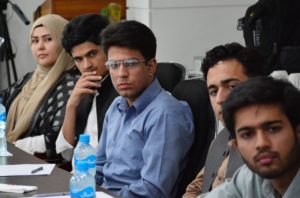
China has also initiated mediation efforts through different channels between the two Muslim neighbors, which have been fruitful so far. Responding to the second question, he said that China considers the Taliban as a relevant stakeholder in the Afghan conflict, but at the same time it recognizes the Afghan government as legitimate and supports it. This implies that China is engaging with all the key actors to arrest peace in the country. Moreover, he stated that Beijing even seconds the Taliban’s demand that the US should withdraw eventually, however, after chalking out a roadmap ensuring stability in the long run.
In conclusion, Mr. Bhittani stated that China’s strategy of taking all stakeholders on board may be a self-enforcing solution for resolving the Afghan conflict. At the end, the ASC team nominated Rafiullah from Afghanistan as the Pak-Afghan Youth Ambassador for the month of June 2018 who was then presented a shield by the Chief Guest. The ASC team also presented an honorary shield of appreciation to the Chief Guest.
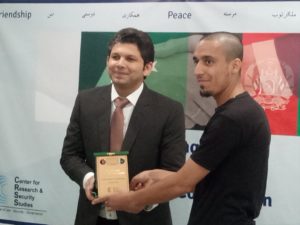
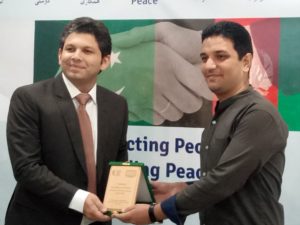
This was the 13th Pak-Afghan Youth Dialogue held under the Afghan Studies Center initiative of CRSS which has an alumni of over 400 Pakistani and Afghan youth now. Afghan Studies Center aims at encouraging peace narratives and critical thinking through its various dialogues and training workshops. You can be part of the discussion on the topic by leaving a comment below.
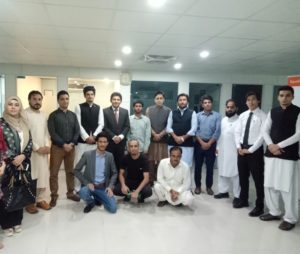
© Copyright Center for Research and Security Studies (CRSS) and Afghan Studies Center (ASC), Islamabad.



